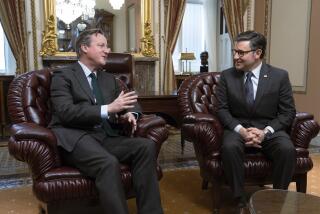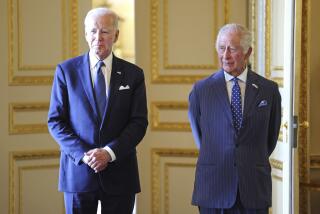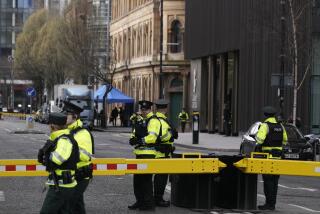BRITAIN : Will Meeting Take Chill Off Major-Clinton Relationship? : Two may find common ground despite differences.
LONDON — Political observers here are bemoaning the unraveling of the “special relationship” that has characterized the partnership of Britain and the United States since World War II.
From the British viewpoint, the country has stood by the United States when the chips were down, particularly when military support was called for in actions ranging from Korea to the Persian Gulf.
But that relationship is said to be in trouble, mainly because of antipathy between Prime Minister John Major, a political conservative, and President Clinton, a liberal.
They just don’t get along, it is said. Not like Margaret Thatcher and Ronald Reagan, and later, George Bush. Or even James Callaghan and Jimmy Carter.
And deep-seated differences between London and Washington haven’t helped:
* Last year, they quarreled over the Clinton Administration’s efforts to lift an arms embargo in Bosnia-Herzegovina.
* More recently, Major has differed sharply with Clinton over his decision to allow Irish republican leader Gerry Adams to raise funds for his Sinn Fein party inside the United States.
* And this week, Clinton seemingly rebuffed Britain’s invitation to attend V-E Day celebrations in London to participate in a Moscow ceremony instead.
Last weekend, the two leaders spoke by telephone for the first time in months. British commentators suggested that, on Northern Ireland, the conversation ranged from cordial to frigid.
But with Major due to spend three days in Washington early next month, efforts are under way to ensure that the conference is successful--or, perhaps more important, appears successful.
“All this talk of troubles in the special relationship is just that, talk,” said a senior British diplomatic adviser who has served in Washington. “We’ve always had our difficulties. They are always resolved. There’s nothing new in this.”
British officials admit that Major was miffed when Clinton failed to heed his advice to prohibit Adams from soliciting funds in the United States.
But the prime minister brightened when Clinton assured him he would press Adams to persuade the Irish Republican Army to “decommission” its weapons--which implies verifying arms stockpiles.
The two leaders are looking at the brighter side: that the Sinn Fein leader, having been handed celebrity status in America, may find it difficult to support a breach of a 7-month-old cease-fire.
The end of the truce could come if the IRA decides it is not getting what it wants from peace talks--a united Ireland.
Otherwise, the two leaders can use the meeting to congratulate themselves on presiding over movement toward peace in Northern Ireland.
So far, the cease-fire has held. The British government and unionist paramilitaries are holding talks on disarmament, and sources believe it is only a matter of time, perhaps days, before senior officials talk to Sinn Fein.
In the past year, both Clinton and Major have suffered severe domestic political damage and may try to find solace in their meeting.
Though Major has differed with Clinton in the past, sources say the prime minister probably realizes that the President is more concerned about maintaining the special Anglo-American relationship than are many of Major’s natural allies, the Republican leaders in Congress.
“Clinton and Major have no difficulty talking to one another,” a Major aide said. “At least, they are both very straightforward.”
More to Read
Sign up for Essential California
The most important California stories and recommendations in your inbox every morning.
You may occasionally receive promotional content from the Los Angeles Times.










